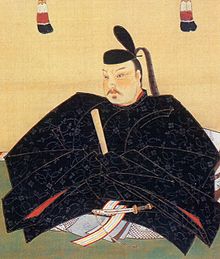Toyotomi Hidenaga (豊臣 秀長, April 8, 1540 – February 15, 1591), formerly known as Hashiba Koichirō (羽柴 小一郎) or Hashiba Hidenaga (羽柴 秀長). He was a half-brother of Toyotomi Hideyoshi,[1] one of the most powerful and significant warlords of Japan's Sengoku period and regarded as 'Hideyoshi's brain and right-arm'.
Toyotomi Hidenaga | |
|---|---|
| 豊臣 秀長 | |
 Toyotomi Hidenaga | |
| Governor of Izumi, Kii and Yamato Province | |
| In office 1585–1591 | |
| Personal details | |
| Born | Koichirō (小一郎) April 8, 1540 |
| Died | February 15, 1591 (aged 50) Kōriyama, Yamato Province |
| Spouse | Chiun'in |
| Relations | Chikuami (father) Ōmandokoro (mother) Toyotomi Hideyoshi (half-brother) Asahi no kata (sister) Toyotomi Hidetsugu (nephew) Toyotomi Hideyori (nephew) |
| Signature |  |
| Military service | |
| Allegiance | |
| Rank | Dainagon |
| Unit | |
| Battles/wars | Chugoku campaign (1577-1582) Battle of Yamazaki (1582) Battle of Shizugatake (1583) Battle of Komaki and Nagakute (1584) Invasion of Shikoku (1585) Kyūshū Campaign (1587) |
Life edit
Hidenaga was also known by his court title, Dainagon (大納言). He promoted Tōdō Takatora to chief engineer. He led Hideyoshi's vanguard force a few years later into Satsuma Province, contributing heavily to his half-brother's victories in gaining control of Kyūshū. Hidenaga was awarded the provinces of Kii, Izumi and Yamato, reaching a governance of one million koku.
He took part in the 1582 Battle of Yamazaki, the 1583 Battle of Shizugatake, also lead Toyotomi's troops at the Invasion of Shikoku (1585), and the 1587 Battle of Takajo, Battle of Sendaigawa and Siege of Kagoshima.[2]
He died in 1591, at Kōriyama, Yamato Province (now Nara Prefecture), and his tomb is called Dainagon-zuka (大納言塚).
During the Warring States period, it was not uncommon for even parents and siblings to engage in lethal conflicts, yet he unwaveringly supported his brother. Many historians believe that "Had Hidenaga lived longer, the Toyotomi regime would have been secure". Indeed, Hideyoshi's Korean campaign and the purge of Hidetsugu occurred after the deaths of Hidenaga and Sen no Rikyū.[3]
Family edit
- Father: Chikuami
- Mother: Ōmandokoro (1516-1592)
- Siblings:
- Toyotomi Hideyoshi
- Asahi no kata
- Tomo, married Soeda Jinbae
- Wife: Chiun'in
- Children:
- Koichiro later Yosuke
- Kikuhime, married Toyotomi Hideyasu
- Daizen-in, married Mori Hidemoto
Honours edit
- Junior Second Rank (August 8, 1587)
References edit
- ^ Sansom, George (1961). A History of Japan, 1334-1615. Satford University: Stanford University Press. p. 321. ISBN 0804705259.
- ^ Turnbull, Stephen (1998). The Samurai Sourcebook. London: Cassell & Co. pp. 236, 238, 240, 276. ISBN 9781854095237.
- ^ "もし秀長がもう少し生きていたら、うまく秀吉にブレーキをかけて、秀次の悲劇も朝鮮出兵も起こらなかったのではないか、とはよく言われるところです。". Rekishi Kaido. Retrieved 16 March 2024.